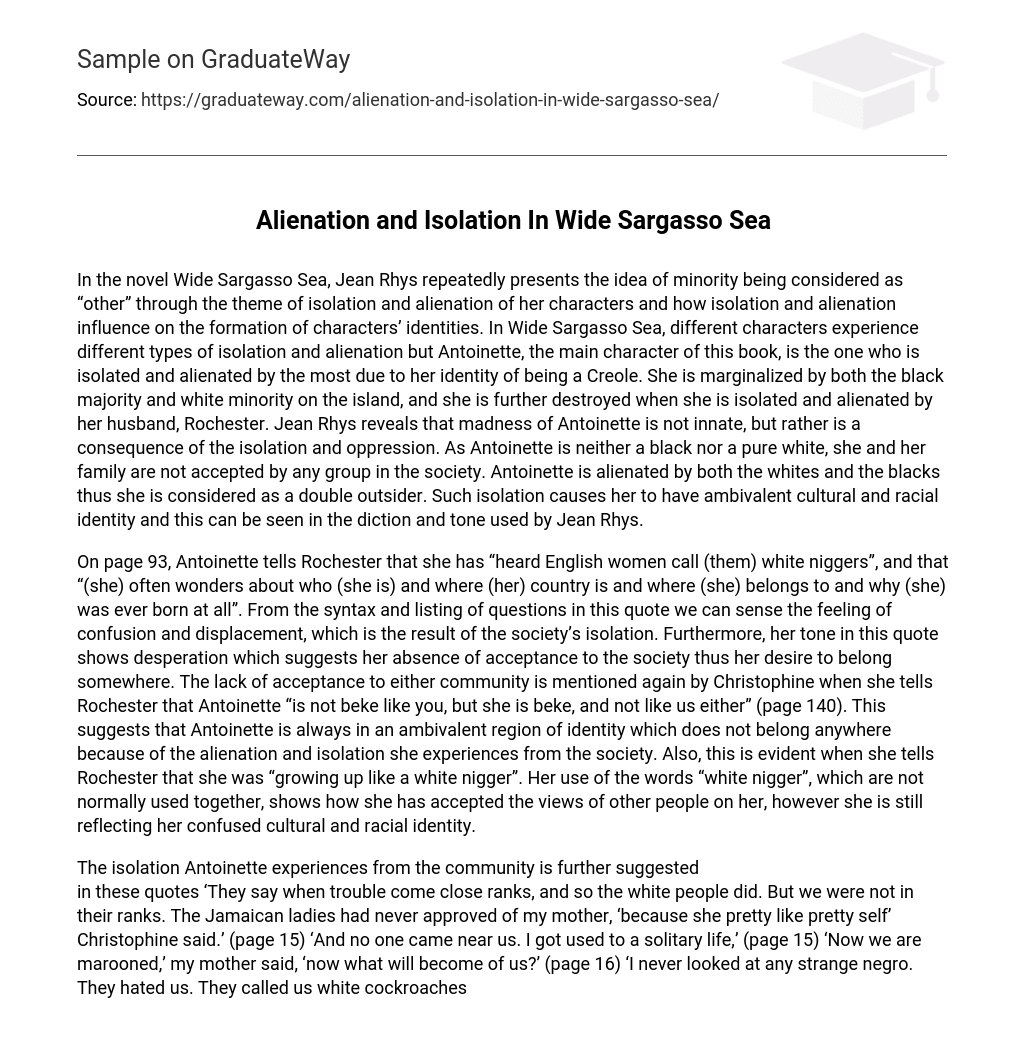In the novel Wide Sargasso Sea, Jean Rhys repeatedly presents the idea of minority being considered as “other” through the theme of isolation and alienation of her characters and how isolation and alienation influence on the formation of characters’ identities. In Wide Sargasso Sea, different characters experience different types of isolation and alienation but Antoinette, the main character of this book, is the one who is isolated and alienated by the most due to her identity of being a Creole. She is marginalized by both the black majority and white minority on the island, and she is further destroyed when she is isolated and alienated by her husband, Rochester. Jean Rhys reveals that madness of Antoinette is not innate, but rather is a consequence of the isolation and oppression. As Antoinette is neither a black nor a pure white, she and her family are not accepted by any group in the society. Antoinette is alienated by both the whites and the blacks thus she is considered as a double outsider. Such isolation causes her to have ambivalent cultural and racial identity and this can be seen in the diction and tone used by Jean Rhys.
On page 93, Antoinette tells Rochester that she has “heard English women call (them) white niggers”, and that “(she) often wonders about who (she is) and where (her) country is and where (she) belongs to and why (she) was ever born at all”. From the syntax and listing of questions in this quote we can sense the feeling of confusion and displacement, which is the result of the society’s isolation. Furthermore, her tone in this quote shows desperation which suggests her absence of acceptance to the society thus her desire to belong somewhere. The lack of acceptance to either community is mentioned again by Christophine when she tells Rochester that Antoinette “is not beke like you, but she is beke, and not like us either” (page 140). This suggests that Antoinette is always in an ambivalent region of identity which does not belong anywhere because of the alienation and isolation she experiences from the society. Also, this is evident when she tells Rochester that she was “growing up like a white nigger”. Her use of the words “white nigger”, which are not normally used together, shows how she has accepted the views of other people on her, however she is still reflecting her confused cultural and racial identity.
The isolation Antoinette experiences from the community is further suggested
in these quotes ‘They say when trouble come close ranks, and so the white people did. But we were not in their ranks. The Jamaican ladies had never approved of my mother, ‘because she pretty like pretty self’ Christophine said.’ (page 15) ‘And no one came near us. I got used to a solitary life,’ (page 15) ‘Now we are marooned,’ my mother said, ‘now what will become of us?’ (page 16) ‘I never looked at any strange negro. They hated us. They called us white cockroaches. Let sleeping dogs lie. One day a little girl followed me singing, ‘Go away white cockroach, go away, go away.’ Nobody want you. Go away.’ (page 20)
In these quotes, we can see the level of isolation Antoinette had through the diction used by Jean Rhys. Especially “we were not in their ranks”, “we are marooned” and sentences that directly show the emotion of hatred such as “they hated us”, “nobody want you” convey the disapproval tone and shows how Antoinette and her family were abandoned. Also Jean Rhys makes the black people to use the word “cockroaches”, the vermin which people are disgusted by the most, to describe Antoinette’s family to show the level of hatred.
As Antoinette has an ambivalent cultural and racial identity caused by the isolation from the society, she desperately seeks for love from Rochester to get healed when she gets married. However, due to Antoinette’s identity of being a Creole and entitled as a mad woman by the others, Rochester fails to understand Antoinette throughout the marriage. Rochester’s lack of understanding leads to a loveless marriage and even further destroys Antoinette as she is alienated by him. In the novel, Rochester defines Antoinette as the “other” who is uneducated and uncultured as he says: “She was undecided, uncertain about facts – any facts……hardly able to believe she was the pale silent creature I had married” (page 80). The disapproval, ignoring tone presented in this quote shows the Rochester’s unwillingness to accept her as his wife.
This is amplified when Rochester calls her a “pale silent creature”. Not only tries to deny the fact that he is married to Antoinette but also he denies that she is a human being by calling her “creature”. Throughout the novel, although Antoinette tells him that she wants to be called by her name, Rochester calls her by other names such as “Vain, silly creature” (page 150), “marionette” (page 140), “doll” (page 136) “Bertha” (page 130). Not calling her by real name shows how Rochester alienates her true identity and his desire of her being someone else. Towards the end of the book, we can see the changes in her state of mind and that she finally realizes that her marriage only ruined herself and it did not affirm her identity as she states: “What am I doing in this place and who am I?” (page 162). Questioning the facts which normal people would know shows the confusion in her inner self and that she is becoming a mad woman, killing herself by firing her place.





